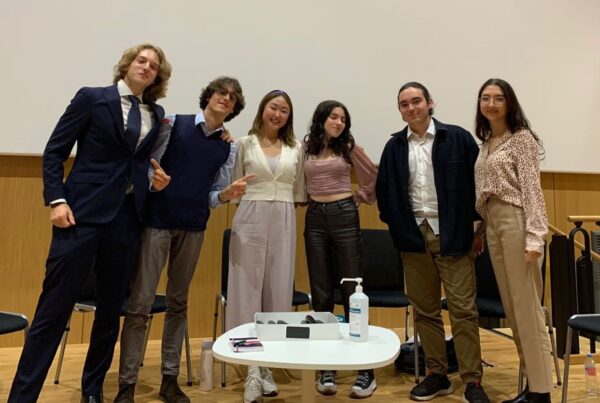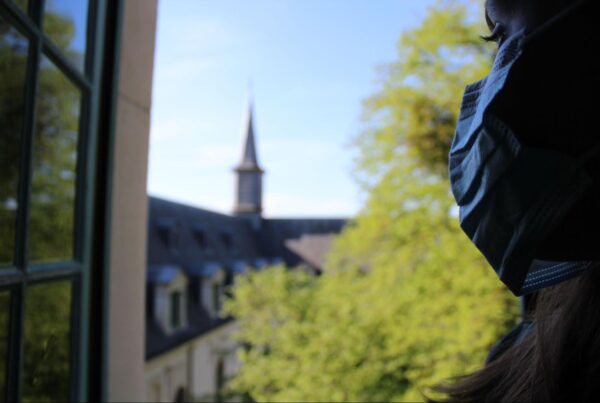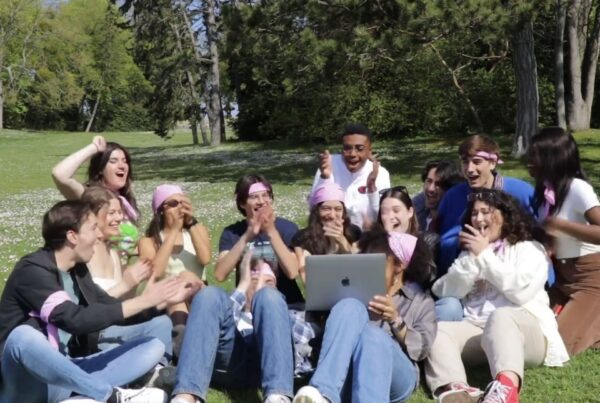 by Maria Lee
by Maria Lee
On April 14th, the first day of Campaign Week 2020, the eight lists running to fill next year’s permanent bureaus unveiled the events they had been planning for weeks. StreamBDE, one of the three BDE lists, and Greengage, the sole runner for SPE, were quickly faced with criticism surrounding one of their events. Indeed, the event at the heart of the matter, a workshop about the production of organic wine and champagne, was titled “E(s)cobar,” a reference to Colombian drug lord and terrorist Pablo Escobar. The play on words was intended to echo StreamBDE’s theme as a streaming platform, as the name of the event was a reference to the Netflix show Narcos.
ALAS, the Latin American Solidarity Association on campus, was quick to voice their criticism and wrote a Facebook post explaining “why this event is disrespectful, offensive and very insensitive to the numerous victims that this man left on Colombian territory.” In response to this, the list changed the event’s name, and posted on their page, stating “it was never in our intention to hurt or make anyone feel insulted by choosing this name.” StreamBDE and Greengage both reached out to ALAS to apologize, and contacted individual students who had criticized the event to start a conversation. The Campaign Committee (CC) also reached out to ALAS members to discuss the situation over a zoom meeting. The association did not request a sanction, but did point out possible infractions of three rules (20.5, 21.1 and 21.2). The CC then reached out to the list to ask them about their intentions regarding the event. No sanctions were delivered, and the CC publicly apologized to ALAS during the announcement of the campaign winners.
To understand the implications of what happened, it is important to understand who Pablo Escobar is, as well as the legacy he left in Colombia and Latin America. Escobar ran the Medellín Cartel, which alongside its rival Cali Cartel, constituted one of the two main drug trafficking organizations in Colombia in the 20th century. According to official data, between 1989 and 1993, over 5000 people died under his orders or in the crossfire, and 10,000 more died in the following twenty years as a result of the violence caused by his organization. To read more about his actions and his effect on Colombian society, here is ALAS’s post. As they put it, “his figure remains one representative of violence and death in Latin America.”
Pablo Escobar is a despised figure in Latin America. He is representative of the pain, suffering, and loss caused by cartel violence in the region, and the recent nature of his actions means thousands of people are still hurting and mourning the loss of loved ones. However, his representation in Western media shows a romanticized version of the figure that is completely taken out of the historical context he existed in, leading to inaccurate conceptions of him and drug trafficking culture outside the region.
Clearly, this remains a very sensitive issue, and the use of the image of Escobar in the context of Campaign Week was shocking for many Latin American students on campus, especially considering his extensive reach in the region. Drug trafficking and cartel violence is something which affects the entirety of Latin America, and something its population lives with on a daily basis. To address this and open a conversation regarding the use and representation of Latin American history and culture on our campus, I first interviewed Colombian students on campus, namely Camila Torres Herrera, one of ALAS’s co-presidents, from Bogotá (the capital of the country) and Steve Hennechart, also a member of ALAS, from Bucaramanga, Santander, in the central northern part of the country.
Both students voiced their initial anger when asked about their reaction to the event. Camila said that “initially, I just felt a lot of anger, like a lot of Colombians do, because it is one of our deepest wounds. It is also the reason we are made fun of a lot, it is one of the largest stereotypes of the country. It has cost a lot of lives. Usually when anyone mentions cocaine or Pablo Escobar to a Colombian, the initial reaction is just anger.” This sentiment was shared by Steve, who spoke of the way the image of Escobar should be used: “when I first saw the event, I felt anger, because Pablo Escobar had an implication with a lot of Colombian people, either in a direct or indirect way. He had an impact on the life of all our family members, and it is really a part of the history of Colombia that has affected all of us in a negative way. It really hurts that some people are using his image for something other than an educational purpose.”
When asked about what they would say to the people that were involved and to the administration, they both expressed that they understood this could have slipped by them, but that did not mean it was okay, as Camila said: “I understand that they probably didn’t know, but once again I would generally be careful when students use historical figures. You need to make sure they have actually researched it properly. I do think it is on the hands of anyone who approved it and whose idea it was, because they all have a responsibility to play,” and Steve explained that the administration “let the event slip because they did not have the necessary information to know that the use of this figure was wrong.” He continued by explaining that the CC had clarified that they did not have the capacity to approve or disapprove events.
Both Steve and Camila emphasized the fact that it is necessary for associations to do better research when it comes to these topics, the latter affirming that “even if it is a viral show, I think you need to take into account bigger consequences, especially regarding a historical event that is not part of your own history. You need to be able to take a more holistic view of the events.” Steve also explained that he understood that the list members were not aware of the sensitivity of the issue, conceding that “we don’t expect everyone to know what happened in Colombia regarding Pablo Escobar, especially because I understand there have been many representations of him in the media that have not been historically accurate.”
Regarding how this reflects and plays into the larger role that Latin American students have on campus, Camila said: “Among Latin Americans on campus, we have discussed many times how we feel we are an accessory to many people, and this kind of proves it. In this particular case, this event was about champagne and wine, which has nothing to do with Colombia – we don’t do either of those – or with Pablo Escobar, who was a drug dealer, a murderer and a rapist. It felt like they were using our history as an accessory to make them look cool, and we are not an accessory.” She continued to highlight the fact that the representation of Latin America is something that goes beyond the scope of this particular incident. When asked about this, Steve turned towards the topic of representation on campus and the use of ALAS as a platform by the Latino community: “Of course in terms of proportions of Latin American students, we are not as present as European students, and I feel like Europe has not had access to truthful and reliable information about Latin America. There are still a lot of clichés and stereotypes, especially around drug trafficking culture and its romanticization.” Finally, he explained that the most important thing in these situations is for people to be “open to dialogue, and willing to hear what we have to say.”
Finally, Camila made it clear she was not angry at the people who were involved, and how she hopes people will approach a situation in which they made a mistake, saying “I don’t know everything about every country, and I don’t expect anyone else to. I just wish people were a little more sensitive and did their research more. I also wish people would humbly accept their ignorance.” Talking about her prior experience in this kind of situation, she explained that among the Latin American community, it can feel as though outsiders feel “proud of their ignorance,” meaning it can sometimes feel as though the people that made the mistake have no inclination to understand or learn from it. She concluded by saying that “it’s okay if you don’t know, we don’t expect you to, but don’t be proud of that. If you do something wrong, accept you didn’t know and try to learn from it. The takeaway from this I think should be that you shouldn’t try to justify yourself, just learn and try to be better.” Steve concluded by highlighting that “what is shown in the media – in TV shows for instance – is not historically accurate,” and that “these representations are not reality and do not show the victim’s point of view. These people should not be romanticized, as the extent of the damage they did is enormous.”
The concerned BDE list reached out to ALAS to apologize, and Cyril Estier, the President of the list, reached out to Camila to apologize and express a willingness to open a conversation with the Latin American community on campus to understand the true extent of the issue. I reached out to the list to present their point of view, and interviewed Cyril, as well as Aminata Diouf (member of the events pole of the list).
Cyril reiterated the fact that the list had no ill intention when creating the event, and explained he had felt extremely disappointed because “we didn’t notice the problem, which is awful because it passed through the campaign committee, us, it went through SPE… No one clicked, which is very unfortunate because we didn’t put enough thought into it.” He explained that “we thought the best way to handle it was to message the people that had commented on it directly and to change the visuals and the name of the event, given the actual event didn’t have a connection to the TV show, as well as to publicly apologize and explain our reasoning behind the change.” To him, the most important thing was “acknowledging the fact that we made a mistake, being prepared to learn from it and reach out to the people who were offended,” as well as “being open to discussion and learning.”
Aminata explained her own point of view on the situation, reflecting on her personal experiences: “I’m in Black Lives Matter (BLM). When something happens relating to the black community, I immediately understand why it is wrong. But because we are not as familiar with the Latino community, we did not realize it was wrong right away.” Being part of an association looking to represent and defend her community on campus, Aminata explained that she found herself on the other side of the conversation for the first time: “it made me think about the way we call out people. BLM was in a similar situation this semester regarding the essay competition by The Sundial. We vigorously denounced the fact that it was posted. This made me think about that and the eventual outcome, because I feel like it brought more hatred than anything. When you are part of a community and you see people from outside that say something that sounds wrong to you, the way you address the situation is really important.” Talking about the huge diversity on campus, she explained that given that we have “different sensibilities to different subjects, the way we communicate with other people is essential to allow them to understand why it could be offensive to another community. The way we react to certain topics needs to take into account who the person you are talking to is, and how they are confronted to the topic in their own environment.” Finally, she expressed the fact that the list’s main concern was “getting across the fact that we are actually sorry and we actually care about the fact that we offended people on campus. We want people to know that our apology is sincere.” She added that “The last thing that a BDE should do is make students uncomfortable” and that “we cannot be on this campus that has over fifty nationalities and ignore the fact that some things might be banal to you but really matter to other people.”
The extensive diversity we are lucky to have on campus means that it is difficult to constantly be aware of the sensitivities of other groups and communities. What transpired during Campaign Week echoes other instances in which a group on campus has felt hurt by another’s actions, and reminds us to try to be sensitive towards other people’s histories and backgrounds. As both parties highlighted in this interview, it is always important to start a conversation, and conversations such as this one about the representation of minority communities on campus are essential, and can benefit all of us. The willingness of both sides to participate has shown the potential we have to learn from each other, and to strive towards greater sensitivity rather than to instill conflict.
Other posts that may interest you:
- The Trouble with ‘Ecocide’
- Carbon dioxide removal – hit or miss?
- Local Victories for Turkish Opposition — A Sign of Hope?
- Are France and Japan a Mismatch Made in Heaven?
- A Reflection on Dark Tourism
Discover more from The Sundial Press
Subscribe to get the latest posts sent to your email.





